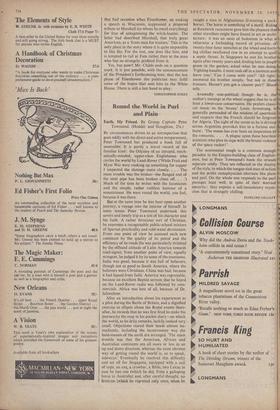Round the World in Purl and Plain
By circumstances driven to an introspection that goes oddly with his direct and active temperament, Peter Townsend has produced a book full of anomalies. It is partly a travel record of the familiar kind : the Odyssey of an intrepid, mech- anically-minded, upper-class Englishman who circles the world by Land-Rover (While Fred and Mynt Wai were cooking up something for supper I inspected the damage more closely. . . . The main trouble was the brakes—the flanged end of the steel pipe has been broken clean off. . . .') Much of the time he writes with the laconicism and the simple, rather ruthless humour of a mountaineer. He went round the world, you feel, because it was there.
But at the same time he was bent upon another journey, a voyage into the interior of himself. In some senses Peter Townsend undertook this severe and lonely trip as a test of his character and his faith. A rather ferocious sort of Christian, he expresses a recognisable public-school mixture of Spartan practicality and cold-water devoutness. From one point of view he assessed each new continent by the quality of its petrol and the efficiency of its roads (he was particularly irritated by the offhand attitude of Latin America towards road-signs); from another point of view, equally stringent, he judged it by its sense of the numinous. India was good, because it was full of believers, though not as good as South America, where the believers were Christians. China was bad, because it had lapsed from faith. America was regrettable, because an excellent Baptist sermon that he heard on the Land-Rover radio was followed by com- mercials. Africa was best of all, because of Dr. Schweitzer.
After an introduction about his experiences as a pilot during the Battle of Britain, and a dignified exercise in ellipsis about the Royal events there- after, he records that he was first fired to make his journey.by the map in his pocket diary—on which the world, as he drily remarks, luckily looked very small. Objections reared their heads almost im- mediately, including the inconvenient way the land-masses of the earth are arranged. 'The main trouble was that the American, African and Australian continents are all more or less in an up and down direction, whereas the most obvious way of getting round the world is, so to speak, sideways.' Eventually he resolved this difficulty and set off for Singapore, equipped with a coil of rope, an axe, a crowbar, a Bible, two Leicas in case he lost one (which he did, from a galloping horse in Australia) and, after careful thought, no firearms (which he regretted only once, when he caught a man in Afghanistan ill-treating a pack- horse). The horse is something of a motif. Riding at Randwick racecourse gave him the pleasure that other travellers might have found in art or archi- tecture : it was an oasis of hedonism in what is otherwise a forbidding record of privation, of twenty-four-hour stretches at the wheel and burn.' ing chillies swallowed raw in an attempt to quell a septic throat. In Singapore he met his brother again after twenty years and, finding him in jungle green in the garden, asked what he was doing. 'Fighting bandits. I must rush off in a moment and leave you.' Can I come with you?' All right,' answered his brother simply, 'but not in those trousers. Haven't you got a cleaner pair?' Blood tells.
Avowedly non-political though he is, the hi author's musings at the wheel suggest that he is at least a lower-case conservative. He prefers classi- cal music to the 'brassy' Louis Armstrong, is ht. generally persuaded of the wisdom of apartheid. and suspects that the French should be forgiven lk for Algeria. The sight of the moon as he is driving el across Argentina provokes him to a furious out- h. burst : 'The moon has ever been an inspiration to the romantic. . . . A plague upon those heartless scientists who plan its rape with the brutal violence of the space rocket!' IC paradox in the Empire-building class of English- The sentimental tough is a common enough el
men, but in Peter Townsend's book the strands separate oddly. They are reflected in the duality of the style, in which the tongue-tied man of action and the prolix metaphysician alternate like plain and purl. On the whole one responds to the purl passages least well, in spite of their worried sincerity : they express a self-immolatory mysti- cism that is strangely chilling.
PENELOPE GILLIKIT






































































 Previous page
Previous page